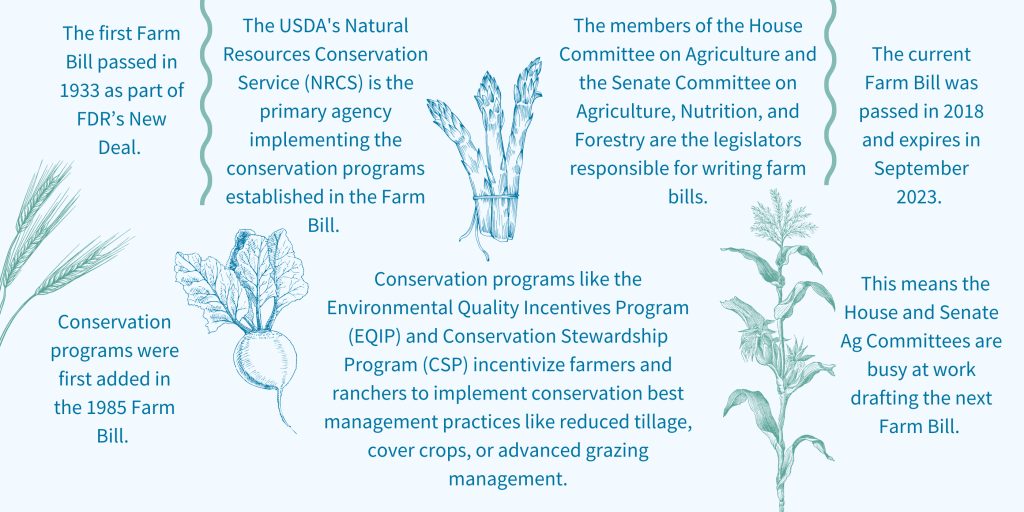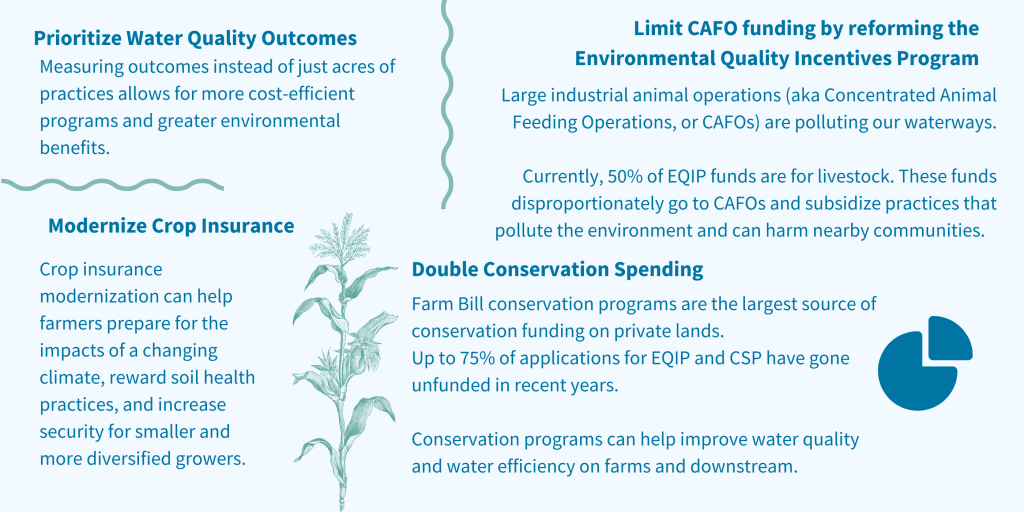Centering Water Quality, Public Health, and Climate Resiliency in the 2023 Farm Bill
When you hear the words “Farm Bill” you might imagine that this legislation impacts farmers and ranchers – which is true – through the Farm Bill farmers can access crop insurance, receive technical assistance from US Department of Agriculture, benefit from research, receive disaster assistance, and more, all because of the Farm Bill.
However, it’s important to know that the Farm Bill impacts everyone! This multi-year omnibus legislation shapes what we eat and how much we pay for food, determines how much financial assistance for food folks can access through SNAP (the Supplemental Nutrition Assistance Program), supports rural development of internet broadband and other services, and sets the stage for how agricultural production can help and harm waterways, the climate, and ecological biodiversity and wildlife habitat.

The 2023 Farm Bill – Water, Climate, Public Health, & Supporting Sustainable Agriculture
The Farm Bill is typically renewed every five years. The current Farm Bill is set to expire in September 2023. Right now, legislators are busy outlining their Farm Bill priorities and drafting marker bills on certain programs that exist through the Farm Bill to make changes to how these programs operate. Passing a Farm Bill is a bipartisan effort, and right now Republicans lead the House Agriculture Committee while Democrats remain in control of the Senate Committee on Agriculture, Nutrition, and Forestry.
Committee members are beginning to introduce marker bills to build support for their Farm Bill priorities. As an individual or organization, you can support marker bills by calling or emailing committee member offices, signing on to letters of support, or participating in coalition efforts to create more buy-in for a certain bill.
I co-chair the Clean Water for All’s Nutrient Pollution Workgroup and help amplify Farm Bill policy priorities that the Workgroup identified through a consensus-based process. The four priorities that the Coalition is supporting are by no means the only priorities out there that can affect our waterways, climate, public health, and sustainable agriculture, but demonstrate how the Farm Bill impacts so many facets of our lives.

Members of the Clean Water for All Coalition say it best when it comes to why advocating for changes to the Farm Bill matter:
“Prioritizing water quality outcomes would guarantee conservation dollars go to only the most cost-effective projects while allowing farmers to profit from environmental improvements. Direct authority to purchase quantified units of environmental improvement or support for state programs doing so could revolutionize the way USDA provides conservation assistance and solve a myriad of administrative challenges while saving taxpayer dollars, increasing producers’ economic sustainability, and cleaning rivers and streams.”
– Harry Huntley, Senior Agriculture Policy Analyst at Environmental Policy Innovation Center
Doubling conservation funding can help…
“One of the benefits of the farm programs is safer drinking water. Farmers have choices and I want there to be funding for farmers that want to put their land in conservation programs that promote water quality.”
– Debbie Neustadt, Sierra Club Volunteer, retired secondary science teacher
Limiting conservation funding from going to CAFOs will… “ensure that taxpayer money supports sustainable, diversified farms rather than subsidizing untreated waste disposal for the largest, most polluting industrial operations.”
– Katie Garvey, Staff Attorney at Environmental Law and Policy Center
“Limiting the amount of federal conservation funding allocated to CAFOs will ensure more funds go towards practices that promote water and air quality and enhance soil, climate, and community health. It will also help even the playing field for small, beginning, and underserved farmers seeking to access conservation funding.”
– Bonnie Angermeier, Legislative Associate at Southern Environmental Law Center
Modernizing crop insurance ensures that…
“Farmers with smaller and more diversified farms can tap into crop insurance coverage and farmers and ranchers dealing with the extremes of climate change – from drought to flooding – can build resiliency and be rewarded for commonsense risk-reducing behavior.”
Read more about these priorities here.
Examples of Marker Bills that Include CWFA Farm Bill Priorities
| The Agriculture Resilience Act, introduced by Representative Pingree (D-ME) and Senator Heinrich (D-NM), would among many other climate-related changes… | Expand the “Sodsaver” provision of the Federal Crop Insurance Act to include all states, improving protection of native grasslands. | Allow for risk-reduction based insurance premium discounts for farming practices such as planting cover crops or soil health-promoting farming practices. |
| The EQIP Improvement Act of 2023, introduced by Senators Booker (D-NJ) and Lee (R-UT)… | Would end the requirement that 50% of EQIP funds go to livestock operations, allowing each state to determine distribution. | Supports the most effective conservation practices while giving states flexibility to reduce payments to practices that have less benefit to the environment. |
Where can I learn more?
River Network is an ally member of the National Sustainable Agriculture Coalition (NSAC). NSAC has a slew of resources about the Farm Bill and a robust 2023 Farm Bill campaign that you can plug in to. Get started here with more background info and check out NSAC’s blogs for up-to-date Farm Bill news.
The Clean Water for All Coalition’s Nutrient Pollution Workgroup leads the Coalition’s efforts on Farm Bill advocacy. The Workgroup meets weekly to discuss a range of nutrient pollution issues but is particularly focused on the Farm Bill right now and has been meeting with legislative staff of House and Senate Ag Committees to discuss the Farm Bill priorities outlined in this blog post. To become a member of Clean Water for All fill out this form and reach out to Jeni Collins at collinsj@nwf.org with any questions.





Wow! Excellent resources by Erin!
Thanks for sharing this excellent post! So many people don’t realize how the Farm Bill creates incentives that impact how farming takes place in the U.S., and who will benefit from federal subsidies. It truly impacts everyone’s daily lives and – for better and for worse – dictates how food is grown and accessed in this country.